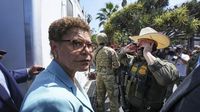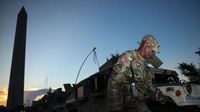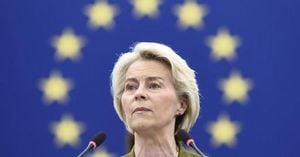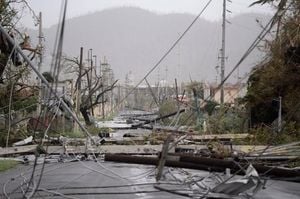President Donald Trump’s recent decision to federalize the Washington, D.C., police department and deploy 800 National Guard members to the nation’s capital has ignited a fierce national debate about crime, federal intervention, and the politics of urban safety. Announced on August 14, 2025, the move followed Trump’s declaration that Washington, D.C., had become a “crime-ridden wasteland,” a characterization he extended to other major cities—Baltimore, Chicago, Los Angeles, and Oakland—all of which are led by Black mayors. The president’s actions, which included supplementing the DC Metro Police with federal law enforcement, have already led to over 100 arrests since the federalization, according to The Daily Wire.
Trump’s rhetoric and actions have not gone unchallenged. Leaders of the African American Mayors Association, led by Van Johnson, mayor of Savannah, Georgia, have pushed back forcefully, arguing that the president’s narrative is not backed by the data. “It gives us an opportunity to say we need to amplify our voices to confront the rhetoric that crime is just running rampant around major U.S. cities. It’s just not true,” Johnson told the Associated Press. He emphasized that recent statistics show a marked decline in violent crime since the pandemic-era spike, a trend echoed by city officials across the country.
Indeed, data from the Washington Metropolitan Police indicate that violent crime has dropped since a post-pandemic peak in 2023. Trump, however, pointed to incidents such as the attempted carjacking of a Department of Government Efficiency employee, along with visible signs of urban blight like homeless encampments and graffiti, as evidence that the city is “getting worse.” He has threatened to extend federal intervention to other cities he deems “horribly run.”
The president’s critics, including some of the nation’s most prominent Black mayors, have accused him of using crime as a political wedge issue and of targeting Democratic strongholds with predominantly Black leadership. “It was not lost on any member of our organization that the mayors either were Black or perceived to be Democrats,” said Johnson. “And that’s unfortunate. For mayors, we play with whoever’s on the field.”
In Baltimore, Mayor Brandon Scott reported historic decreases in both homicides and nonfatal shootings in 2025, with carjackings down 20% in 2023 and other major crimes falling in 2024. Scott attributed the improvements to the city’s Comprehensive Violence Prevention Plan, launched in 2021, which emphasizes community violence intervention and victim support. “He has actively undermined efforts that are making a difference saving lives in cities across the country in favor of militarized policing of Black communities,” Scott told the Associated Press, referring to Trump. Despite what he described as federal roadblocks, Scott vowed to continue collaborating with regional federal law enforcement partners.
Oakland, too, has seen tangible progress. According to a midyear report by the Major Cities Chiefs Association, the city experienced a 21% drop in homicides and a 29% decrease in all violent crime during the first half of 2025 compared to the same period in 2024. Mayor Barbara Lee credited these gains to collaborations with community organizations and the city’s Department of Violence Prevention. “These results show that we’re on the right track,” Lee said at a news conference. She dismissed Trump’s assessment of Oakland as “fearmongering,” insisting that the president’s remarks were not grounded in facts but rather in attempts to score political points.
Community leaders in Oakland have echoed Lee’s concerns. Nicole Lee, executive director of Urban Peace Movement, warned that the presence of federal forces could undo years of progress. “It creates kind of an environment of fear in our community,” she said, noting that community groups have played a crucial role in reducing violence through leadership training and victim support. She also expressed concern that federal interventions might lead to curfews, which could disproportionately criminalize young people of color. “If you’re a young person, basically you can be cited, criminalized, simply for being outside after certain hours,” Lee said. “Not only does that not solve anything in regard to violence and crime, it puts young people in the crosshairs of the criminal justice system.”
Los Angeles Mayor Karen Bass, facing similar federal scrutiny, argued that the administration’s actions were more about political theater than public safety. Homicides in Los Angeles fell 14% between 2023 and 2024, a trend Bass attributed to focused local efforts rather than federal intervention. She called the federal takeover a “performative power grab,” insisting that it ignores the real progress being made on the ground.
Chicago Mayor Brandon Johnson highlighted his city’s “historic progress driving down homicides by more than 30% and shootings by almost 40% in the last year alone.” According to Johnson, these improvements are the result of targeted community engagement and violence reduction initiatives, not outside intervention. He, like his counterparts, has expressed skepticism about the effectiveness of a militarized approach to urban law enforcement.
Despite the pushback, supporters of Trump’s policies argue that federal intervention is necessary to restore order in cities plagued by persistent violence. White House deputy press secretary Taylor Rogers told The Daily Wire, “Public safety isn’t political; it’s a top priority for every American, and the Democrats continue to brush it under the rug.” Rogers added that instead of criticizing Trump’s “tough-on-crime” policies, Democratic leaders should focus on cleaning up their own cities, which she described as “some of the most dangerous places in America.”
Not all responses from city leaders have been adversarial. In Detroit, ranked fifth among the most dangerous cities by U.S. News & World Report, officials pointed to a significant drop in crime rates in 2024. John Roach, spokesman for Mayor Mike Duggan, said, “With the enhanced efforts of the new U.S. Attorney, Jerome Gorgon, Detroit this year is experiencing the lowest level of gun violence since 1965.” Roach welcomed expanded funding for federal prosecutors and agencies, emphasizing the success of existing federal-city partnerships and expressing hope that these would not be disrupted by new federal actions.
Meanwhile, speculation persists about the possibility of federally imposed curfews and other restrictive measures in Washington, D.C. While Pentagon press secretary Kingsley Wilson confirmed that National Guard troops would not be armed, the exact scope of their duties remains unclear. The increased presence of federal agents and military personnel has raised concerns about the militarization of city streets and the potential chilling effect on community-led safety initiatives.
As the situation continues to unfold, urban leaders are watching closely to see how D.C. Mayor Muriel Bowser navigates the unprecedented federal intervention. Van Johnson praised Bowser for her ability to balance critique and cooperation, stating, “Black mayors are resilient. We are intrinsically children of struggle. We learn to adapt quickly, and I believe that we will and we are.” The coming weeks will test not only the effectiveness of federal intervention but also the resilience of local strategies that have already begun to yield results in some of America’s most scrutinized cities.





